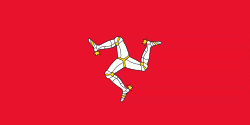Manx language
Manx (Gaelg or Gailck, pronounced or ), also known as Manx Gaelic, is a Gaelic language of the insular Celtic branch of the Celtic language family, itself a branch of the Indo-European language family. Manx is the historical language of the Manx people.
Although only few children native to the Isle of Man speak Manx as a first language, there has been a steady increase in the number of speakers since the death of Ned Maddrell in 1974. He was considered to be the last speaker to grow up in a Manx-speaking community environment. Despite this, the language has never fallen completely out of use, with a minority having some knowledge of it as a heritage language, and it is still an important part of the island's culture and cultural heritage.
Manx is often cited as a good example of language revival efforts; in 2015, around 1,800 people had varying levels of second-language conversational ability. Since the late 20th century, Manx has become more visible on the island, with increased signage, radio broadcasts and a Manx-medium primary school. The revival of Manx has been made easier because the language was well recorded, e.g. the Bible and the Book of Common Prayer had been translated into Manx, and audio recordings had been made of native speakers.
Although only few children native to the Isle of Man speak Manx as a first language, there has been a steady increase in the number of speakers since the death of Ned Maddrell in 1974. He was considered to be the last speaker to grow up in a Manx-speaking community environment. Despite this, the language has never fallen completely out of use, with a minority having some knowledge of it as a heritage language, and it is still an important part of the island's culture and cultural heritage.
Manx is often cited as a good example of language revival efforts; in 2015, around 1,800 people had varying levels of second-language conversational ability. Since the late 20th century, Manx has become more visible on the island, with increased signage, radio broadcasts and a Manx-medium primary school. The revival of Manx has been made easier because the language was well recorded, e.g. the Bible and the Book of Common Prayer had been translated into Manx, and audio recordings had been made of native speakers.
Country
-
Isle of Man
The Isle of Man (Mannin, also Ellan Vannin ), also known as Mann , is a self-governing British Crown Dependency in the Irish Sea between Great Britain and Ireland. As head of state, Charles III holds the title Lord of Mann and is represented by a Lieutenant Governor. The government of the United Kingdom is responsible for the isle's military defence and represents it abroad.
Humans have lived on the island since before 6500 BC. Gaelic cultural influence began in the 5th century AD, when Irish missionaries following the teaching of St. Patrick began settling the island, and the Manx language, a branch of the Goidelic languages, emerged. In 627, King Edwin of Northumbria conquered the Isle of Man along with most of Mercia. In the 9th century, Norsemen established the thalassocratic Kingdom of the Isles, which included the Isle of Man. Magnus III, King of Norway from 1093 to 1103, reigned as King of Mann and the Isles between 1099 and 1103.
